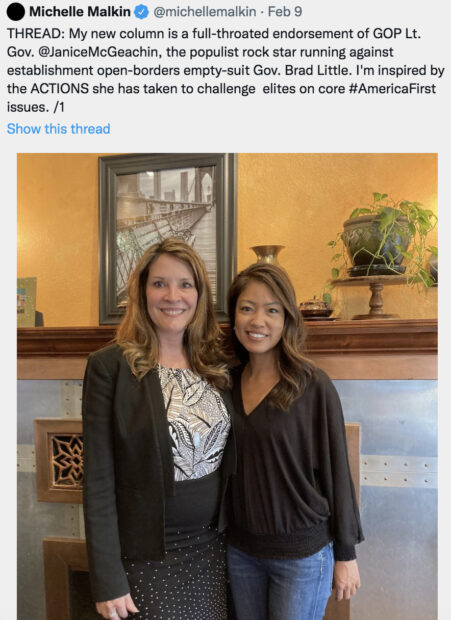Every parent wants to be the fun parent.
The one who organizes the trip to the zoo and the ice-cream run, while the other parent is stuck at home.
In the custody battle for the Statehouse, Gov. Brad Little is playing the fun parent these days, traveling the state to hand out the treats of a $1.9 billion surplus. Meanwhile, his chief Republican rival, Lt. Gov. Janice McGeachin, is at the Capitol, doing the daily chores of presiding over the state Senate.
Five weeks in, this election-year legislative session couldn’t be going much better for the fun parent.

Little began his session-in-progress victory tour Friday, when he marked the passage of a $600 million income tax cut with a signing ceremony at a Meridian business. On Tuesday, he started a statewide tour to celebrate phase one of school employee health insurance overhaul; the first of four “teacher appreciation rallies” took place at Melba Elementary School.
Look, I don’t make the governor’s schedule. However, I suspect he’ll have plenty of other made-for-photo-op moments this session, since other pieces of his 2022 agenda seem almost preordained. The Legislature is likely to plow $104 million of state and federal money into the teacher salary career ladder. Little’s plan to put an additional $47 million into early literacy — a pathway to state-funded all-day kindergarten — looks like a safe bet. His $50 million Empowering Parents Grants proposal is on the fast track, flying through the Senate on a 34-1 vote Thursday.
Little could have ample reason to visit schools again in the next few weeks.
There’s nothing illegal about what Little is doing. But there’s nothing subtle about it either. Little is inevitably blurring the line between policymaking and his still-unannounced re-election bid, but he’s capitalizing on one of the advantages of incumbency.
It all started on Jan. 10, with a State of the State address that took a decidedly political tone — replete with jabs at the Biden administration over vaccine mandates, inflation and border security. And it continued Wednesday, while Little was traveling the state on his teacher appreciation rally roadshow. The governor’s office released a two-minute video, narrated by Kuna High School teacher Allison Touchstone, breaking down the math of the state’s surplus and the feds’ $30 trillion debt.
Political? It’s hard to view it any other way.
Meanwhile, McGeachin has found herself tethered to Senate chambers and standing downstage. (She didn’t respond to a request for comment for this article.)
Sure, McGeachin is on Twitter playing the hits: railing against mask mandates, decrying the homeless tent protest that has cropped up across the street from the Statehouse, and renewing her battle with Little over her authority to stand in as acting governor.
 McGeachin also tried to take back the news cycle Wednesday, touting an endorsement from controversial columnist Michelle Malkin. Citing her task force on education indoctrination last summer, Malkin wrote, “McGeachin has taken unapologetic action Gov. Little and state GOP elites repeatedly for their routine capitulation on education policy, medical freedom, and law and order.”
McGeachin also tried to take back the news cycle Wednesday, touting an endorsement from controversial columnist Michelle Malkin. Citing her task force on education indoctrination last summer, Malkin wrote, “McGeachin has taken unapologetic action Gov. Little and state GOP elites repeatedly for their routine capitulation on education policy, medical freedom, and law and order.”
Malkin last surfaced in Idaho elections last fall, when she endorsed David Reilly, a failed Post Falls school board candidate who received national scrutiny over a series of anti-Semitic tweets. Maybe Malkin’s endorsement carries more weight in a closed GOP primary than it does in a nonpartisan school trustee race. Maybe Malkin — who can be described, delicately, as a polarizing figure — energizes some of the hardliners McGeachin is counting on in order to win.
There is some risk to Little’s strategy as well. Some of his big education initiatives — especially school employee health insurance and all-day kindergarten — aren’t likely to go over big with hardcore conservative primary voters.
However, Little is clearly counting on a bigger base, and trying to appeal to a more moderate cross-section of voters. Such as the cafeteria workers, bus drivers and other school employees and their families, who also stand to benefit from the K-12 health insurance plan. Or the working-class moms and dads who could get a share of the Empowering Parents Grants. Or the parents who might have to pay tuition, or higher property taxes, to send a young child to full-day kindergarten.
One thing is becoming increasingly apparent. It looks like Little will get to campaign this year on a 2022 legislative session that will unfold according to his plan.
Now that Little’s $600 million income tax cut is on the books, it gobbles up a good chunk of the surplus and appears to cut off other tax bills at the pass. Conservative Republicans and Democrats backing grocery tax repeal — an idea Little has endorsed but didn’t incorporate into his 2022-23 budget — are trying every parliamentary move in the playbook to get a vote. Another attempt failed on the House floor Thursday morning. With every procedural vote, Little’s income tax bill looks more like the tax bill of the session.
The school employee insurance plan also consumes a considerable chunk of the surplus. The bill Little signed this week doesn’t cost any money, but the subsequent spending bills would take up $75 million in one-time money and $105 million in annual, ongoing costs.
Every time one of Little’s spending proposals passes, it leaves that much less surplus or federal stimulus money to spend. It leaves the final budget looking that much more like the one Little recommended 31 days ago.
And it gives Little that many more chances to play the fun parent — one who just happens to want custody for another four years.
Kevin Richert writes a weekly analysis on education policy and education politics. Look for his stories each Thursday.
